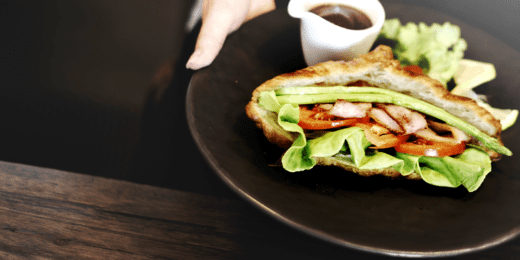Baking has enjoyed a huge boost in popularity over the past couple of years. Thanks to the runaway success of a rebooted Great British Bake Off – alongside a surge in demand for an enhanced café culture across the UK – people are looking at baking in a whole new way. Some of you may even be thinking about starting a bakery!
If you’re passionate about baking and are looking for a unique and rewarding way in which to make a living, you could even use this new public obsession with baking to support a new business.
According to the Federation of Bakers, the UK bakery market is worth around £3.6 billion – giving it one of the biggest shares of the food industry. Every day, almost 11 million loaves of bread and packs of cakes and other baked goods are sold.
Does that sound like something you’re keen to explore? Unfortunately, starting a bakery isn’t simply a matter of rolling up your sleeves and picking up a rolling pin. That being said, starting a baking business is a relatively affordable and straightforward process. You’ve just got to plan carefully and be sure to follow a few key steps.
To help you get started cooking up your own baking business, we’ve compiled this Rapid Guide with all the information you’ll need to succeed.
- Training and qualifications
- Setting up shop
- Getting insured
- Rules and regulations
- Top tips
Key Takeaways
- No formal training is required to start a bakery business in the UK. Basic education is recommended, but not essential.
- Start by choosing a baking business model that aligns with your skills and budget, and understanding hygiene regulations.
- Leverage social media to showcase your products and engage with customers.
Training and qualifications
One of the best parts about becoming a baker is that you don’t need any formal qualifications. The UK Government’s National Careers Service recommends you attain GCSEs at grades 9 to 4 in subjects like English, maths, science and food technology – but even that’s just a friendly bit of advice. If you’re keen on becoming a baker, all you need is a few basic skills and the resolve to develop your trade.
If you would like to start a baking business, you’ll find it incredibly useful to have basic measuring and mathematical skills, practical skills, and organisational skills. You’ll also need the ability to multitask and work under tight deadlines. After all, baking is often considered an exact science. But even if you’re not a master baker, you can always start a baking business and then take on staff who have more of a knack for it.
If you are committed to becoming an artisan baker, there are plenty of optional training courses and programmes you can take advantage of. One of the most prestigious is the National Bakery School, which is part of London South Bank University. They have multiple three-year undergraduate courses that would give you a fantastic foundation for setting up a baking business – from baking science and technology to baking technology management and food safety.
Most local colleges also have part-time or evening courses dedicated to learning baking skills – and similarly, a degree in business could be greatly beneficial in starting a new business. But again, these are all optional. Courses like these will help you to develop the skills you’ll need quicker, but you aren’t legally obliged to attain a degree to start your own baking business.
Beyond optional training programmes and degrees, there are several regulatory requirements you will need to satisfy in terms of food safety – but we’ll get to that in a minute.
Setting up shop
Once you’re satisfied that you’ve got a broad understanding of how to bake or run a bakery, it’s time to start thinking about the type of baking business you’d like to run. The industry is actually split into several different strands of activity, and the business model you choose to follow will inevitably vary depending upon your skills, start-up budget, and ambition.
This will all need to be addressed in detail when you write your initial business plan, so it’s worth making a serious decision about your business activity before you further develop your business idea.
Most UK bakeries fit roughly into one of four categories:
Online bakeries
An online bakery can ordinarily be run from your home or a small premises and is a fantastic option for entrepreneurs looking to test the water before they dive into baking head-first. Online bakeries typically carry out activity on an order-to-order basis, which means start-up costs and overheads are low.
Counter service bakeries
Counter-service bakeries are the most popular bakery type in the UK, with several national chains present across the country. These bakery businesses rent or own small commercial space in which customers can walk in and order baked goods at a counter managed by staff.
Sit-down bakeries
Sit-down bakeries have increased in popularity over the past five years. These businesses will rent out slightly larger commercial space, allowing customers to order baked goods and then sit down to enjoy them on-site.
Specialty bakeries
Specialty bakeries are the least common bakery type in the UK and do exactly what they say on the tin. If you’d like to specialise in one area of baking or want to focus entirely on baking wedding cakes or event catering, this is the business model for you.
The type of premises you choose for your new bakery will depend largely upon the model you choose, however, it’s worth noting that if you do choose to start a bakery from home and you are living in rental accommodation, you will want to obtain written permission from your landlord to run your business on the property. UK law dictates your landlord cannot unreasonably withhold or delay permission.
Likewise, if you are a property owner, then your mortgage provider may have stipulations regarding home-run businesses. When in doubt, always contact them to ask.
So, exactly how much does it cost to set up a baking business in the UK? Again, it depends on how ambitious your plans are, but generally speaking, you’ll need to budget for the following:
- Licencing and legal fees: £500-1,000
- Equipment: £1,000-£5,000
- Start-up supplies and ingredients: £2,000-3,000
- Commercial rent or mortgage: £500-2,500
Again, that’s only a rough guide. Your start-up costs will vary depending upon where you’re setting up shop and the type of baking business you’re trying to open. But once you get up-and-running, you’ll also need to budget for overheads like utilities, internet, regular ingredients, and marketing.
You’ll also need to inform HMRC (if you’re self-employed) so they will know how you should be paying tax. If you decide to run your business from home as a part-time operation, you may simply want to register as a sole trader. This effectively means that, in the eyes of the law, you are your business.
But if you’re keen to protect your personal assets and finances, you may want to consider registering your business as a limited company.
Why would you want to form a limited company? Above all else, registering a company will ensure that you will be protected from any financial problems, your business could run into if things don’t work out.
When you form a limited company in the UK, your baking business will obtain a new status as its own legal entity. In turn, you as the owner will be granted ‘limited liability’ and will only be held liable for company debts up to the value of your shares in the company. Your personal finances will be kept safe if your baking business ends up in debt.
If you’d like to learn more about limited companies and why you should think about setting one up for your bakery, consult our blog.
Getting insured
As with any type of business, you will need to obtain several types of basic insurance before your bakery starts trading. Depending upon the type of bakery you’ve chosen to open, you may want to explore the following types of business insurance:
Public liability insurance
Public liability insurance protects you and your business if someone is injured or their property ends up being damaged because of your business.
Employers’ liability insurance
If you have an employee, use contractors, temporary staff or casual workers for your business, you will be required by law to obtain employers’ liability insurance. This will protect you and your business if employees become seriously ill while on the job.
Business contents insurance
Just like the contents insurance product you might have as a tenant or property owner, this insurance offers blanket protection to a lot of the things you’ll have in your business premises.
Stock or tools insurance
If you are storing products and supplies on your business premises, you may want to think about taking out stock insurance. This protects you from theft or damage. You can also take out similar policies relating specifically to your baking tools.
Personal accident insurance
Personal accident cover will ensure that if you’re injured or become seriously ill, you will be able to receive financial compensation to support you. If you’re running a business by yourself and will not be able to trade if something bad happens, this is a smart product to invest in.
If you’re setting up a sit-down bakery, you may be able to get most of these types of cover under one umbrella package called “café insurance”. Lots of UK insurance providers offer this cover, and so it’s worth taking a look at a comparison site like comparethemarket.com to find the product that’s perfect for your new business.
Rules and regulations
There aren’t a whole lot of regulatory hurdles you’ll need to overcome to open a bakery – but as you’d imagine, you will need to comply with several crucial food safety and hygiene rules
Before setting up any type of food business in the UK, you are legally obligated to register your premises with your local authority’s environmental health service. This must be done a minimum of 28 days before you start trading, and you must register even if you’re running your business from home.
The registration process does not cost any money to complete, and your local authority cannot refuse your approval. The process simply sees a local official visit your home or premises to check out the space you’ll be using to prepare food and ensure it is safe and sanitary.
To learn about restrictions, what’s considered safe and how to get in contact with your local authority to register, check out the UK Government website.
You will also be legally required to create a plan based on the Hazard Analysis and Critical Control Point (HACCP) Principles. A HACCP food plan will keep your food safe from biological, chemical and physical hazards, and ensures you’ve identified any hazards, critical points, and keep detailed records.
As a food business registered with your local authority, you will also be required to comply with any and all rules established and administered by the Food Standards Agency. This body of government provides guidelines on sampling, labeling, traceability, and hygiene standards – which are often enforced by your local authority.
Top tips
Just like any other type of company, no two bakeries are 100% alike. What works for one baking business might not necessarily suit you and your business, or the kinds of products or services you choose to develop. That being said, there are a few key pieces of advice that tend to hold true for all baking businesses – no matter where they are, what they are selling, or who’s running them.
That’s why we’ve rounded up these four top tips to help you succeed as a bakery owner:
Pricing is crucial
Just like baking itself, pricing your products is an exact science. As part of your business plan, you should conduct extensive market research to find out what sort of prices your competitors are charging for similar products. You’ll need to match or beat those products unless you are confident your businesses have unique selling points that will push customers to willingly pay more for your products.
If pricing low to beat the competition, don’t forget that baking products often offer a fairly tight profit margin, and so you can’t afford to go too low – or you won’t make enough to pay your overheads.
Stay clean
It might be second nature to some, but if you’re not a very clean and tidy person, you’ll need to fix that when you’re at work. Sites where people are purchasing and consuming food need to be kept up to a certain degree of hygiene and cleanliness as part of government food regulations – but many customers will expect you to go beyond the bare minimum to provide a squeaky clean site they’re comfortable eating at.
Get social
It doesn’t matter whether you’ve started an online-only bakery or a large sit-in bakery – you must maintain a social media presence. Because baking products are so aesthetically pleasing, you should be capturing lots of shots and sharing them on sites like Facebook and Instagram. Competitions and encouraging positive online reviews are also a fantastic way to increase footfall and business.
Listen to your customers
When it comes to baking, the only opinions that matter are those of your customers. Ask them about what they like and what they don’t like. If a product isn’t selling well, try something new and experiment using elements that your regulars all seem to enjoy.
Develop a unique selling point
You don’t need to run a specialty bakery to develop USPs that are specific to your business. Differentiate yourself and your business with signature flourishes, lunchtime specials, regular social media competitions or a quirky interior. Anything that makes your business stand out is bound to enhance your ability to succeed.
The bottom line
So, we’ve given you the basic facts you will need to obtain optional qualifications, set up shop, look around for the insurance coverage you’ll need, and tips to help you succeed. But there’s plenty more to think about when developing your business – and we’re always happy to help.
If you have any questions, our knowledgeable team members are always on standby to offer you assistance. Simply get in touch by tweeting us at our Twitter handle @RapidUKOfficial and via our Facebook Page.
Please note that the information provided in this article is for general informational purposes only and does not constitute legal, tax, or professional advice. While our aim is that the content is accurate and up to date, it should not be relied upon as a substitute for tailored advice from qualified professionals. We strongly recommend that you seek independent legal and tax advice specific to your circumstances before acting on any information contained in this article. We accept no responsibility or liability for any loss or damage that may result from your reliance on the information provided in this article. Use of the information contained in this article is entirely at your own risk.








Join The Discussion
Comments (6)
Hi there, I’m asking wich type of class I need to start my bakery. I mean do I need a class 3?
Or even class 3 restricted will be ok.
I’m based in Edinburgh.
Thank you for your kind enquiry, Daniele.
We are not experts in this subject; however, it is likely you would require Class A3 to open a bakery where members of the public walked in.
I trust this information is of use to you.
Regards,
Rachel
I was so surprised there was nothing at all about employment costs – and managing a team! You would be hard-pressed to run a sit down bakery by yourself without any staff!
Thank you for your kind comment, Amy.
Yes, you are correct, larger bakeries will have staff and we may look to update this blog article in future to incorporate this information.
Regards,
Rachel
Have Albanian citizenship, would like to invest in the baking/pastry industry by opening a branch of a successful business in Tirana.
How can I get a UK work permit?
Hi Giuliano,
There are no requirements for an Albanian to open a UK limited company and a branch within the UK. It may be wise to enlist the services of someone based in the UK who has the right to work in the UK. The UK has a large Albanian population, so you may already know people who you can use for this purpose. However, if you yourself do not hold UK citizenship and wish to carry out business within the UK, you would need to be sponsored. For more information, please see here: https://www.gov.uk/tier-2-general
I trust this information is of use to you.
Kind regards,
Rachel